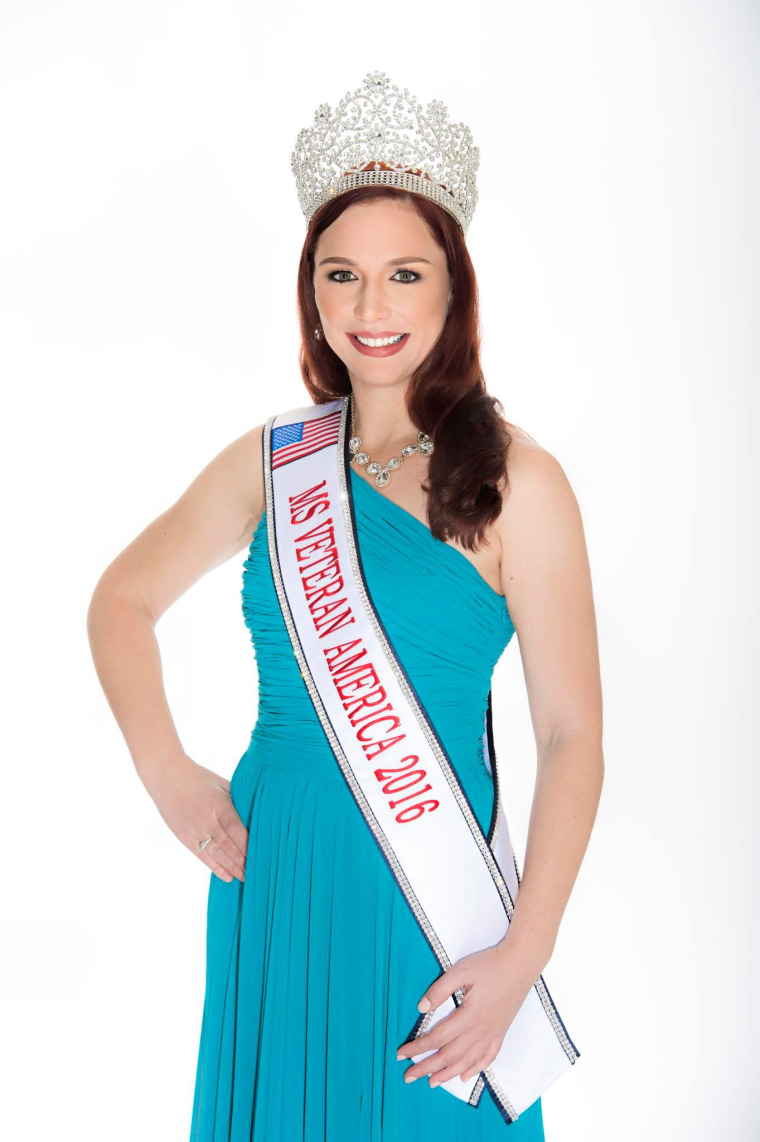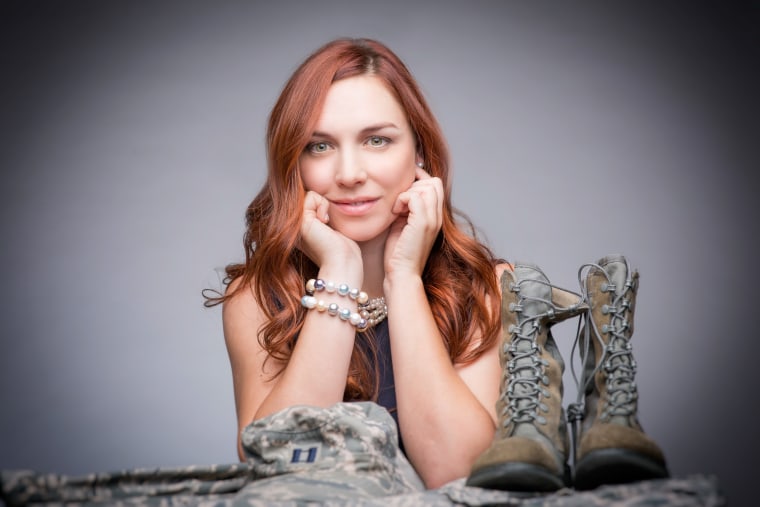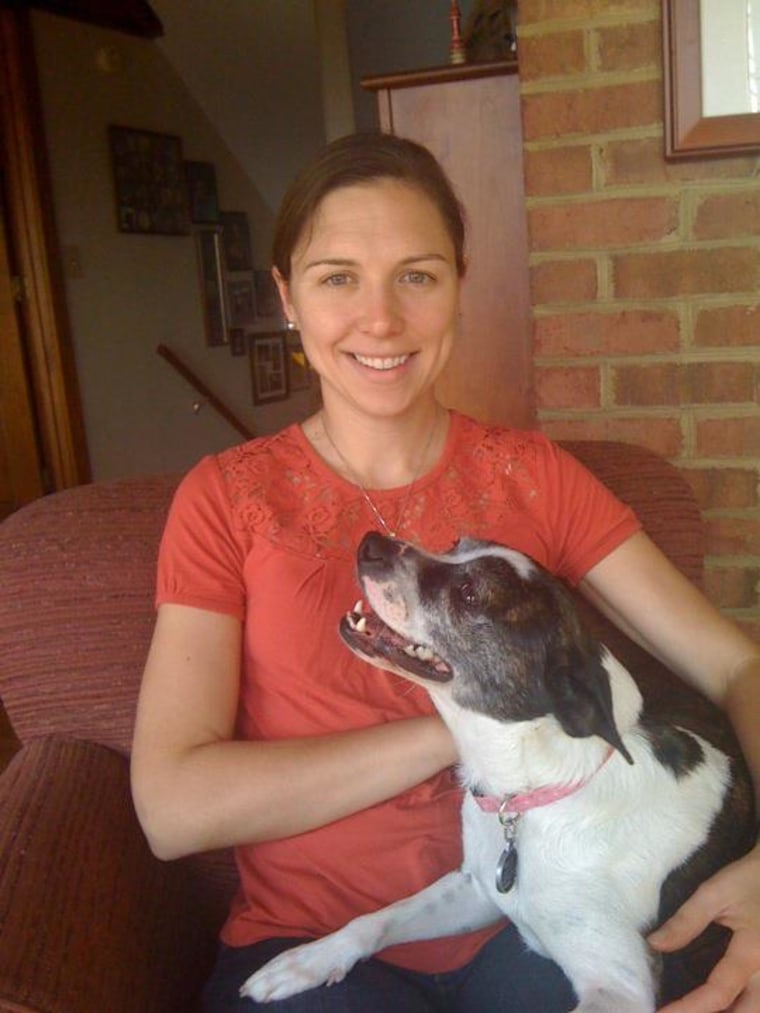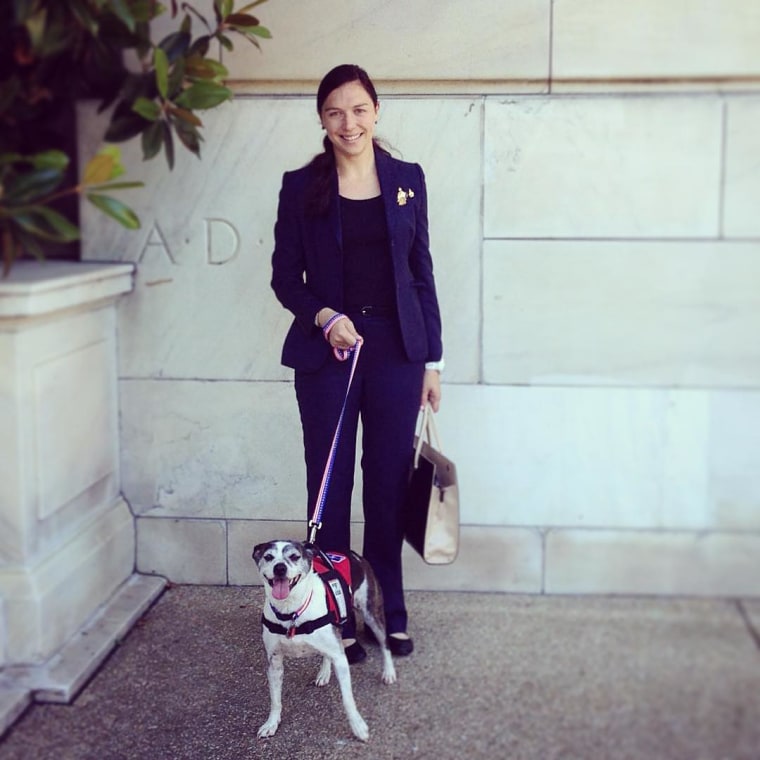Molly Mae Potter, pictured here at peak glamour, was the winner of this year's Ms. Veteran America pageant (yep, that's a thing), but before the crown, it was a tough transition back from war coping with anxiety and night terrors.
That is, until she met Bella.

The Air Force captain was deployed in 2010 to Afghanistan, where she served as a flight test engineer. While there, her base came under attack — and a rocket blast knocked her unconscious.
Since her physical injuries weren’t serious, Potter shrugged it off and went back to work. But there were, in fact, invisible scars that only emerged when she returned home the following year.
RELATED: How service dogs help veterans with PTSD heal, embrace life again
That was when Potter, 31, began to experience debilitating symptoms: exhaustion, headaches, anxiety, insomnia and an extreme preoccupation with running and weight.

“Because I couldn’t sleep, I would be out running 10 miles at 2 a.m.,” she told TODAY. “Suddenly I couldn’t make it through a day of work or get along with anyone. I was sickly. I was depressed. My life and my marriage were falling apart.”
Potter, the daughter of two Army veterans, knew she was struggling but didn’t want to tell anyone for fear of losing the medical clearance to continue doing her job — the one thing she felt she had left.

“As a woman in the military, you don’t want to ask for help, ever, because you’ll be perceived as weak,” she explained. “I felt like I had to be above average to be average. To say I’m suffering, that I’m getting a divorce, to ask for help … was unbearable.”
Since her issues weren’t disciplinary, her colleagues didn’t know what to make of her behavior. “They said, 'If you had a drinking problem, we’d know what do with you,’” she recalled.
RELATED: Service dogs help military veterans on their inspiring road to the Paralympics
Eventually, her commander realized there was a mental health issue at play. The North Carolina native was honorably discharged and entered an inpatient mental health program, where she was diagnosed with traumatic brain injury and post-traumatic stress disorder.
About five months into her intensive therapy, Potter’s mom sent Bella, one of the family dogs, to live with her.
“I had always been a big dog person,” said Potter. “I think she thought I could use some company.”

Bella’s arrival set off a string of positive changes for Potter. “She would need to get walked in the morning, so I’d have to get out of bed. And I’d say, ‘You know what? Maybe I’ll take a shower,” Potter recalled. “I’d feed Bella and say, ‘Maybe I’ll feed myself.’ She started making it bearable to get through the day.”
Perhaps the biggest change came after dark.
RELATED: Heartwarming photo shows service dog calming bride before wedding
“She started waking me up in the middle of the night. I thought she had to go outside, or needed water … eventually I realized she was waking me up as I was having night terrors," said Potter, who lives in Austin, Texas. "So I stopped having them. I could finally start sleeping through the night … My brain was finally healing itself because I was getting eight hours of sleep.”
Potter was able to go off her sleeping medication. She began driving again and making strides in therapy. She was doing so well that the military offered her a part-time job on base, which she accepted on the condition that Bella could accompany her.
“At first I showed up and they were like, ‘What the hell is this?’” said Potter. “Others said, ‘This dog got this airman back in uniform, got her health back in check.’ So (Bella) came with me every day, and I worked to get the regulations changed so that if you are in PTSD therapy, you are allowed to bring an emotional support animal.”

RELATED: How an ex-military dog rescued the veteran who needed him most
Potter eventually left the military on her own terms, but Bella has stayed by her side….most days. “I needed her with me all the time at one point,” said Potter. “She got me back to where I am not dependent on her.”
While Potter credits her restored sleep as the key to her recovery, she also explained how Bella’s presence helps her when she starts “looping,” a mental pattern that many PTSD patients experience.
“When I start spiraling, I can’t think. I can’t drive. My brain gets frozen,” she said. “I trained myself to go to the dog, to look at the color of her eyes, her eyelashes, her paws. I’m petting her, there’s a psychological point … It helps me focus.”
Bella has since been trained as a full service dog. Potter believes the influence these animals can have is invaluable. "A person can’t always be there for you," she said. "And an animal has instincts that a person wouldn’t have.”
Then, of course, there is the unconditional love.
RELATED: 70-year-old veteran could barely walk 10 feet — until this dog entered his life
“In the military, I felt like there was so much stigma around mental health,” said Potter, who is using her role as Ms. Veteran America to advocate for treatment and resources to help veterans with PTSD.
“It’s so helpful to have that positive reinforcement after negative reinforcement for so many years," she said. "To have someone say, ‘It’s OK to go outside! Hang out with me! It’s OK mom, it’s all gonna be all right!"